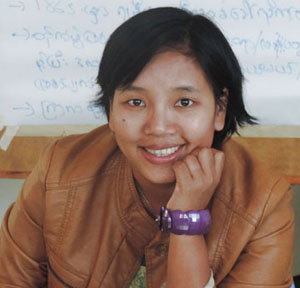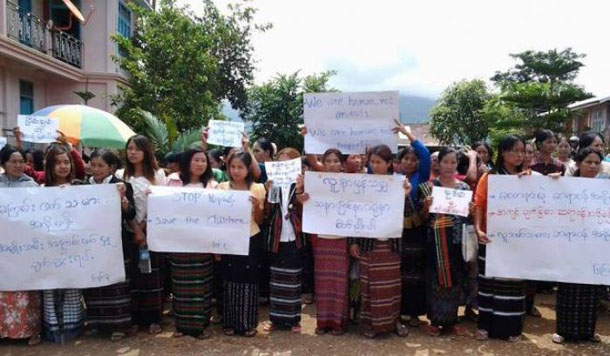On June 10, a soldier from the Burma Army’s Light Infantry Battalion 269 allegedly attacked and attempted to rape a 55-year-old woman near Razua, in Chin State’s Matupi Township. When about 600 women across two villages staged a demonstration calling for justice in this and similar cases, four of their leaders were charged under the Peaceful Assembly Law. In a normal democratic society, problems are discussed and resolved, but this government is not taking that path.
The legal definition of rape varies from one country to another depending on the formal laws or customary practices, and yet the constant composition of rape remains the same—the perpetrator and the victim, or survivor, as feminists would prefer.
Some feminists avoid using the term “victim” as it implies that women have no power over their own lives. Some of the worst impacts of rape are that survivors suffer from self-blame, powerlessness, self-rejection, anger, hatred and constant fear, let alone stereotyping and stigmatization by family members and the community.
Guns or nuclear and chemical weapons can kill or handicap human beings. But rape can also destroy the physical and psychological welfare of women. We do not have cure like we do for diseases. Women live with fear and stigmatization for the rest of their lives. When men in uniforms exercise their power and commit such crimes, it does not cost a single bullet, it is a free weapon. Worse yet, it is an effective weapon because the government and the military institutions themselves can easily dismiss the allegations by demanding medical evidence of rape from the survivors. With little chance of such evidence being collected immediately after a rape, the survivor is unlikely to have the opportunity to seek fair judgment.
One needs to look at how power and rape relate to one another, and how a man can feel empowered to commit sexual assault against a stranger. Rape involves the power relationships between men and women, the poor and the rich, employers and employees, those in military uniforms with weapons and unarmed women. It also involves education and social status, and ethnicity. These socially structured norms and categories make women vulnerable and perpetrators take advantage. Because of these structures, society is more tolerant or even condones sexual violence against women, whereas these crimes should be considered serious crimes and dealt with using a zero tolerance policy.
Over the past 10 years, women’s organizations along the Thai-Burmese border have documented heart-breaking stories of women who have been raped by the Burmese military, the Tatmadaw, but the cases documented so far represent the tip of the iceberg. The latest documentation on rape cases was by the Women’s League of Burma (WLB), which highlighted about 100 alleged rapes that have taken place in ethnic regions since President Thein Sein’s quasi-civilian government took power in 2011. The surprising fact is that no action has been taken against the perpetrators.

This failure to investigate the cases; to reform the military’s regulations, if there are any, to be more effective; and to make the perpetrators accountable shows two things. First: Thein Sein has no power over the Tatmadaw, and second: the president is unable to bring legal punishment against perpetrators for serious crimes. Let’s not forget that for more than six decades, this same institution, the military, governed Burma, setting policies and directly implementing and administering those policies. If they had the political will to stop sexual crimes committed by these perpetrators, they could stop it now.
Until now, this crime continues throughout Burma’s ethnic states. Because incidents of rape do not randomly occur in one place, rather they occur across the seven ethnic states, the problem is widespread. Rape is also committed where there is a heavy Burmese army presence, and the same pattern continues—it is systematic. Some international legal experts would urge that this is neither systematic nor widespread because the rape incidents did not occur in one place at once and the incidents are not massive in number. Of course, the Burmese army knows what happens to perpetrators where mass rape incidents occur, such as in Rwanda. To me, the Tatmadaw is clever enough to learn that mass rape is too big to be ignored by the government or the international community.
After studying rape cases in Chin State or to Chin women since 2005, I constantly ask myself: “Why would a soldier rape a woman in those rural villages who are poor, and often older in age?” “What is it the perpetrators want, to satisfy their sexual desires?”
The Chin Human Rights Organization (CHRO) has reported several rape cases in Chin State under the current government, including the recent case in Matupi. And yet, this government responded by arresting people who raise their concerns and dismissing the cases.
In previous cases, often it appears that the use of rape is a state-condoned policy. If Thein Sein’s government is sincere, there are immediate actions he can take. First, his government should recognize that rape is used against ethnic women by the Tatmadaw soldiers and that legal reform is needed to deal with rape cases, changing the approach of the legal process to look beyond medical evidence and consider the motive, circumstances, power relations and harm to the survivor. Second, courts need to be well-equipped for women when they report rape cases. Let us remember that no woman would want to be raped and report the assault they suffered. Third, during the current peace talks, ending rape against ethnic women should be on the agenda. Only when these actions are taken should we applaud Thein Sein’s presidency.
Cheery Zahau is a human rights activist from Chin State. The views expressed here are the author’s own.

















